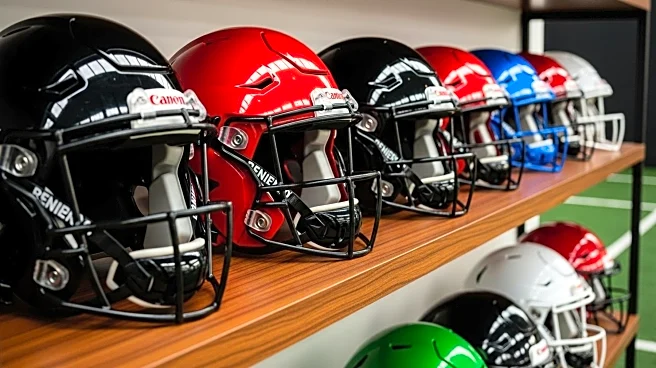What's Happening?
The 2025 college football season has seen remarkable performances from freshman quarterbacks across various programs. Notably, CJ Carr of Notre Dame has demonstrated poise and accuracy, ranking seventh nationally in QBR. Julian Sayin from Ohio State has been efficient, leading the nation with an 80.2% completion rate. Bear Bachmeier of BYU has guided his team to a 5-0 start, showcasing his dual-threat capabilities. Other freshmen like Jaron-Keawe Sagapolutele and Drake Lindsey have also shown potential, despite facing challenges in their respective games. These quarterbacks are making significant impacts early in their collegiate careers, with some already being considered future NFL prospects.
Why It's Important?
The emergence of talented freshman quarterbacks is crucial for college football programs as they look to build competitive teams for the future. These players bring fresh energy and skill, potentially transforming their teams' dynamics and performance. Their success can influence recruitment strategies, as programs may prioritize scouting and developing young talent. Additionally, standout performances from freshmen can boost a team's visibility and attract more fans and media attention, enhancing the program's reputation. For the players, early success can lead to increased opportunities, including potential NFL draft prospects and endorsement deals.
What's Next?
As the season progresses, these freshman quarterbacks will face tougher opponents and more challenging situations, testing their resilience and adaptability. Their continued development will be crucial for their teams' success and their personal growth as athletes. Coaches will likely focus on refining their skills, particularly in areas like decision-making and handling pressure. The performances of these quarterbacks could also impact their teams' standings and bowl game prospects. Observers will be keen to see how these young players handle the pressure and whether they can maintain their impressive starts.
Beyond the Headlines
The success of freshman quarterbacks may lead to a shift in how college football programs approach player development and recruitment. There could be an increased emphasis on identifying and nurturing talent at an earlier stage, potentially changing the landscape of college football. Additionally, the pressure on these young athletes to perform consistently could raise discussions about mental health and support systems within collegiate sports. The long-term impact of their early success could influence their career trajectories and the future of college football.










